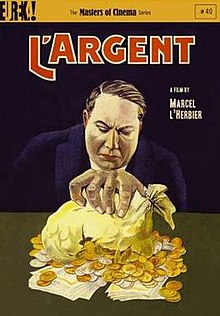L'Argent (1928 film)
| L'Argent (1928) | |
|---|---|

Cover for DVD of L'Argent (1928)
|
|
| Directed by | Marcel L'Herbier |
| Produced by | |
| Screenplay by | |
| Based on |
L'Argent by Émile Zola |
| Starring | |
| Cinematography | Jules Kruger |
| Distributed by |
|
|
Release date
|
|
|
Running time
|
|
| Country | France |
| Language |
|
| Budget | FF 5,000,000 |
L'Argent ("money") is a French silent film directed in 1928 by Marcel L'Herbier. The film was adapted from the novel L'Argent by Émile Zola, and it portrays the world of banking and the stock market in Paris in the 1920s.
Marcel L'Herbier had become one of the most prominent French film-makers during the 1920s, but even after he had sought greater creative independence by establishing his own production company, Cinégraphic, he experienced continual frustration over the financial arrangements under which he had to work. He said that after ten years of making films, he became "obsessed by a single idea: to film at any cost, even (what a paradox) at great cost, a fierce denunciation of money".
He chose as the basis of his story Zola's novel L'Argent about the corrupting power of money throughout society, but he insisted that it should be updated from the 1860s to present-day Paris. He envisaged a film on a large scale (having been impressed by Abel Gance's Napoléon) and set about arranging a budget of 3 million francs (the eventual cost was nearly 5 million.). To achieve this he had to put his own company in partnership with the Société des Cinéromans of Jean Sapène, and also agreed a distribution deal with the German company UFA which resulted in the engagement of two German stars among the cast.
Saccard and Gunderman are rival Paris bankers. Saccard sees an opportunity to rescue his failing bank, Banque Universelle, by financing the solo transatlantic flight of Jacques Hamelin, a pioneering aviator, and then capitalizing on his popularity to set up a colonial business project in Guyane. He also hopes to seduce Hamelin's wife Line in his absence. When a rumour circulates that Hamelin has crashed, Saccard exploits the false reports to manipulate shares at the Bourse.
Gunderman disapproves of Saccard and his methods, and has secretly bought shares in his bank as a future weapon against him. The Baroness Sandorf, a former lover of Saccard, acts as a spy to assist Gunderman's interests, and more particularly her own.
Hamelin's work in Guyane becomes an expensive liability, and his failing eyesight prevents him from keeping adequate control of the accounts. Saccard ensnares the naïve Line in mounting debts which compel her to tolerate his attentions. Incited by Sandorf, Line makes a formal complaint about Saccard's financial dealings, which launches an enquiry, and when she discovers how her husband's reputation has been compromised by Saccard she tries to shoot him at a party. Sandorf now restrains her, fearful for her own investments if Saccard were to die. Gunderman sells his shares in Saccard's bank and precipitates its collapse. Saccard is arrested, along with Hamelin who has returned to France. Saccard's duplicity is exposed in court, and through Gunderman's intervention Hamelin is released. Saccard goes to prison, but wastes no time before planning new financial schemes - with the aid of his gaoler.
...
Wikipedia
